ガンディー 「非暴力の巨星」「インド独立の父」 生涯と非暴力思想
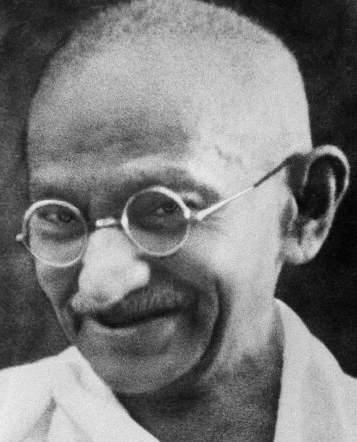
Gandhi: “The Nonviolent Icon” and “Father of Indian Independence” – His Life and Philosophy of Nonviolence
イントロダクション
ガンディーは、インドの非暴力運動家として知られる「非暴力の巨星」とも呼ばれ、インド独立の父として尊敬されています。
彼の生涯は、非暴力思想を中心に展開され、その影響力は世界中に広がりました。
この記事では、彼の生い立ちから非暴力運動の展開、そして彼が残した遺産について詳しく探っていきます。
ガンディーの信念と行動は、多くの人々に勇気と希望を与え、現代の社会にも大きな影響を与えています。彼の生涯と非暴力思想について、詳しくご紹介します。
Introduction
Mahatma Gandhi, known as the “Nonviolent Icon” and revered as the Father of Indian Independence, is celebrated as a prominent figure in India’s history of nonviolent activism.
His life centered around the philosophy of nonviolence, a principle that resonated globally and continues to influence societies worldwide.
This article delves into Gandhi’s upbringing, the evolution of his nonviolent movement, and explores the legacy he left behind.
Gandhi’s beliefs and actions have inspired courage and hope in countless individuals and have had a profound impact on modern society. Join us as we explore his life and philosophy of nonviolence in depth.
ガンディーの人物像
ガンディーの基本プロフィール
ガンディーは、インドの政治家であり、平和主義者でもありました。
彼は1869年に生まれ、1948年に亡くなるまで、非暴力と非協力運動の指導者として活躍しました。
彼はインド独立運動の中心的な人物であり、「非暴力の巨星」としても知られています。
ガンディーの特徴と性格
ガンディーは、非暴力と平和主義を信じる人物でした。
彼は自らの信念を実践するために、断食や禁欲などの厳しい生活を送りました。
また、彼は非暴力の原則に基づいて、平和的な抵抗や公民権運動を展開しました。
ガンディーはまた、人種や宗教の平等を信じ、差別や暴力に反対しました。
彼はインドの貧困層や社会的弱者の権利を守るために奮闘し、平和的な社会改革を目指しました。
ガンディーの人物像は、彼の非暴力思想とリーダーシップの力によって形成されました。
彼の哲学と行動は、多くの人々に影響を与え、今日でも尊敬されています。
ガンディーの基本プロフィール
ガンディーは、インド独立運動の指導者であり、非暴力の思想を提唱した人物です。
彼の基本プロフィールは、彼が1869年に生まれ、1948年に暗殺されるまでの生涯を通じて、平和と自由のために闘い続けました。
彼は信仰心が厚く、ヒンドゥー教の価値観に基づいた生活を送っていました。
また、ガンディーは非常に謙虚で、自己犠牲の精神を持っていました。
彼の特徴的な行動としては、非暴力抵抗や断食などがあります。
ガンディーの性格は、穏やかで思慮深く、人々に対して寛容な態度を持っていました。
彼は自己啓発を重視し、常に自分自身を高めることを心がけていました。
彼の人物像は、多くの人々に感銘を与え、今でも世界中で尊敬されています。
Mahatma Gandhi’s Persona
Basic Profile of Gandhi
Mahatma Gandhi was a politician and advocate of peace in India.
Born in 1869 and active until his assassination in 1948, he led movements of nonviolence and civil disobedience.
He stood at the forefront of India’s independence movement and is known as the “Nonviolent Icon.”
Traits and Character of Gandhi
Gandhi was a believer in nonviolence and pacifism.
He lived a rigorous life of fasting and austerity to practice his beliefs.
Based on the principle of nonviolence, he led peaceful resistance and civil rights movements.
Gandhi also championed racial and religious equality and opposed discrimination and violence.
He fought for the rights of India’s impoverished and socially disadvantaged, aiming for peaceful social reform.
Gandhi’s persona was shaped by his philosophy of nonviolence and the strength of his leadership.
His philosophy and actions have influenced many and continue to be respected today.
Basic Profile of Gandhi
Gandhi was a leader of India’s independence movement and a proponent of nonviolent philosophy.
His basic profile spans from his birth in 1869 to his assassination in 1948, marked by a lifelong struggle for peace and freedom.
He was deeply religious, living according to Hindu values.
Gandhi was remarkably humble and had a spirit of self-sacrifice.
His distinctive actions included nonviolent resistance and fasting.
Gandhi’s character was gentle, thoughtful, and characterized by tolerance towards others.
He emphasized self-improvement and lifelong learning.
His persona has left a lasting impression on many and continues to be respected worldwide.
ガンディーの特徴と性格
な問題に対しても積極的に取り組みました。
彼は差別や貧困などの問題に対して声を上げ、解決策を模索しました。
ガンディーの特徴と性格は、彼の非暴力思想の根底にある価値観や信念から生まれています。
彼の生涯は、多くの人々に勇気と希望を与えるものとなりました。
ガンディーの生涯
ガンディーの生涯は、非暴力の巨星として知られています。
彼はインドの独立の父とも呼ばれ、その非暴力思想で多くの人々に影響を与えました。
ガンディーの生い立ち
ガンディーは1869年にインドで生まれました。
彼は貧しい家庭に育ちましたが、学問に熱心であり、早くから社会的な問題に関心を持っていました。
弁護士としてのガンディー
ガンディーは弁護士としてのキャリアをスタートさせました。
彼は法律の知識を活かし、人々の権利を守るために奮闘しました。
イギリスによる裏切りとガンディー
インドはイギリスの植民地であり、ガンディーはイギリスの支配に対して不満を抱いていました。
しかし、イギリスは約束を破り、ガンディーを裏切ったことで彼の闘争心が高まりました。
ガンディーと不服従運動
ガンディーは非暴力の手法を用いた不服従運動を展開しました。
彼は抗議行動やストライキを通じて、インドの独立を求める声を広めました。
ガンディーと第二次世界大戦
第二次世界大戦が勃発すると、ガンディーは平和を訴えました。
彼は戦争に反対し、非暴力の原則を守ることを強調しました。
ガンディーとインドの独立
ガンディーの闘争は実を結び、1947年にインドは独立を果たしました。
彼の指導力と非暴力の思想が、インドの独立運動に大きな影響を与えました。
ガンディーの暗殺
しかし、独立後のインドは内部の対立や宗教的な紛争が起こりました。
そして、1948年にガンディーは暗殺されました。
彼の死は多くの人々に衝撃を与え、彼の非暴力の思想は永遠に記憶されることとなりました。
ガンディーの生涯は、その非暴力思想と闘争によって多くの人々に感銘を与えました。
彼の功績はインドだけでなく、世界中に広がっています。
ガンディーの生い立ち
ガンディーの生い立ちは、彼の非暴力思想の基盤を築く重要な要素でした。
彼は1869年、インドのポルバンダールで生まれました。
ガンディーは家族と共に中流階級で育ち、英語教育を受けました。
彼は幼少期から真面目で宗教的な性格であり、早くから倫理的な価値観を持っていました。
その後、ガンディーはイギリスで法学を学ぶために渡英しました。
弁護士としてのキャリアをスタートさせた彼は、南アフリカでの活動を通じて人権問題に目覚めます。
イギリスによる裏切りに直面したガンディーは、不服従運動を展開しました。
第二次世界大戦時には、彼はインドの独立を求める闘いに参加しました。
そして、1947年にインドが独立を果たすと、ガンディーはその成果を喜びました。
しかし、その喜びも長くは続かず、1948年に彼は暗殺されました。
ガンディーの生涯は、非暴力の巨星としての彼の存在を象徴しています。
Gandhi’s Characteristics and Personality
Gandhi actively engaged with various issues throughout his life.
He raised his voice against discrimination, poverty, and other societal problems, striving to find solutions.
Gandhi’s characteristics and personality stem from the values and beliefs underlying his philosophy of nonviolence.
His life has inspired courage and hope in many people.
Gandhi’s Life
Gandhi is renowned as the icon of nonviolence.
He is hailed as the father of India’s independence, influencing many with his philosophy of nonviolence.
Gandhi’s Early Life
Gandhi was born in 1869 in India.
Coming from a modest background, he showed early academic prowess and a keen interest in social issues.
Gandhi as a Lawyer
Gandhi embarked on his career as a lawyer.
Utilizing his legal knowledge, he fought to protect people’s rights.
Betrayal by Britain and Gandhi
India was a British colony, and Gandhi harbored discontent towards British rule.
However, when Britain broke promises, it fueled Gandhi’s determination.
Gandhi and Civil Disobedience Movement
Gandhi launched civil disobedience movements using nonviolent methods.
Through protests and strikes, he amplified the call for India’s independence.
Gandhi and World War II
During World War II, Gandhi advocated for peace.
He opposed war and emphasized the principles of nonviolence.
Gandhi and India’s Independence
Gandhi’s efforts bore fruit, and India achieved independence in 1947.
His leadership and philosophy of nonviolence profoundly influenced India’s independence movement.
Gandhi’s Assassination
However, post-independence India faced internal conflicts and religious disputes.
In 1948, Gandhi was assassinated, shocking many and ensuring his philosophy of nonviolence would be remembered forever.
Gandhi’s life has inspired countless people through his philosophy of nonviolence and his struggles.
His legacy extends beyond India, impacting the world at large.
Gandhi’s Early Life
Gandhi’s early life laid the crucial foundation for his philosophy of nonviolence.
Born in 1869 in Porbandar, India, Gandhi grew up in a middle-class family and received an English education.
From a young age, he was earnest and religious, possessing ethical values.
Later, Gandhi traveled to Britain to study law.
Starting his career as a lawyer, he became awakened to human rights issues through his activities in South Africa.
Facing betrayal by Britain, Gandhi initiated civil disobedience movements.
During World War II, he joined the struggle for India’s independence.
In 1947, when India gained independence, Gandhi rejoiced in its achievement.
Yet, his joy was short-lived as he was assassinated in 1948.
Gandhi’s life symbolizes his role as a nonviolent icon.
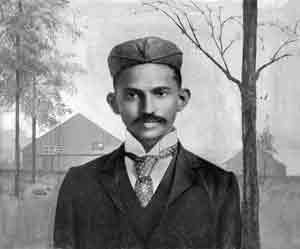
Gandhi in South Africa (1895)
弁護士としてのガンディー
ガンディーは、弁護士としての経歴も持っていました。
彼は南アフリカで法律を学び、現地のインド人社会の権利擁護に取り組みました。
彼は差別や不平等に立ち向かうために、法的手段を駆使しました。
ガンディーは、特にインド人労働者の権利を守るために奮闘しました。
彼は労働者のための法的支援を提供し、彼らが適正な待遇を受けることを求めました。
また、彼は差別的な法律に反対し、公正な扱いを求める運動を展開しました。
彼の弁護士としての活動は、彼の非暴力思想と密接に関連していました。
彼は法的手段を通じて社会的変革を起こすことを信じており、暴力を用いることなく権力者に対抗する方法を模索しました。
ガンディーの弁護士としての活動は、後の彼の政治的な活動にも影響を与えました。
彼は法的手段だけでなく、非暴力抵抗や不服従運動などの手法を用いて、社会的な不正に立ち向かいました。
弁護士としてのガンディーは、彼の生涯において重要な役割を果たしました。
彼の法的なスキルと非暴力思想は、彼の後の政治的な活動やインドの独立運動に大きな影響を与えました。
ガンディーの弁護士としての功績は、彼の人道的な理念とともに、今もなお称賛されています。
イギリスによる裏切りとガンディー
ガンディーは「非暴力の巨星」としても知られ、インド独立運動の指導者としても大きな影響力を持っていました。
彼の生涯は非常に興味深いものであり、彼の非暴力思想は多くの人々に感銘を与えました。
ガンディーは1869年にインドのポルバンダルで生まれました。
彼の父は地方の高官であり、ガンディーは裕福な家庭で育ちました。
彼は法律を学ぶためにイギリスに渡り、弁護士としての道を歩むことを決めました。
しかし、イギリスによる裏切りがガンディーの人生を大きく変えることになります。
彼は南アフリカでの弁護士活動中に差別と不平等を目の当たりにし、それに対抗するために非暴力抵抗運動を始めました。
この経験がガンディーの非暴力思想の基盤となりました。
その後、ガンディーはインドに戻り、不服従運動を展開しました。
彼はインド人の権利を守るために非暴力抵抗を主導し、多くの人々を鼓舞しました。
また、第二次世界大戦中にはインドの独立を求めてイギリスに対抗しました。
そして、1947年にインドは独立を達成しましたが、ガンディーはその喜びを長くは味わうことはありませんでした。
彼は独立後のインドの分裂に悲しみを感じ、宗教間の対立を和解するために努力しました。
しかし、彼の思想に反発する者によって暗殺されてしまいました。
ガンディーの生涯と非暴力思想は、今でも多くの人々に影響を与え続けています。
彼はインド独立の父として称えられ、その功績は忘れられることはありません。
Gandhi as a Lawyer
Gandhi had a career as a lawyer as well. He studied law in South Africa and advocated for the rights of the local Indian community. He used legal means to confront discrimination and inequality, particularly fighting for the rights of Indian laborers to fair treatment. Gandhi opposed discriminatory laws and campaigned for fair treatment through peaceful means, closely aligned with his philosophy of nonviolence. His work as a lawyer influenced his later political activities, where he employed methods such as nonviolent resistance and civil disobedience to confront social injustices. Gandhi’s achievements as a lawyer played a crucial role throughout his life, shaping his humanitarian ideals and contributing significantly to India’s independence movement.
Betrayal by the British and Gandhi
Gandhi, also known as the “Mahatma” or “Great Soul” of nonviolence, wielded immense influence as a leader of India’s independence movement. His life story is profoundly intriguing, with his philosophy of nonviolence inspiring countless individuals. Born in 1869 in Porbandar, India, to a well-off family with his father serving as a local official, Gandhi chose to study law in England. However, betrayal by the British would profoundly alter Gandhi’s path. During his legal career in South Africa, he witnessed firsthand discrimination and inequality, prompting him to initiate nonviolent resistance movements in response. This experience laid the foundation for Gandhi’s philosophy of nonviolence. Returning to India, Gandhi led civil disobedience campaigns to protect Indian rights and inspire many. During World War II, he opposed British rule to demand India’s independence. In 1947, India achieved independence, yet Gandhi did not live long to savor this victory. He mourned India’s post-independence partition and strove to reconcile religious conflicts. Ultimately, Gandhi was assassinated by those who opposed his philosophy, but his life and nonviolent ideology continue to inspire people worldwide. He is revered as the father of India’s independence, and his legacy remains unforgettable.
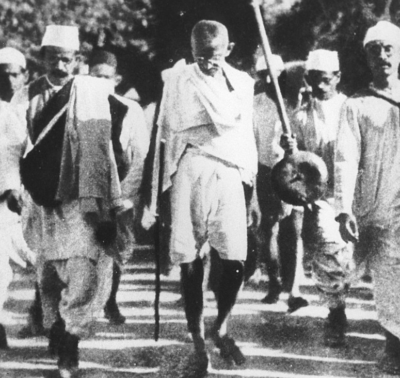
“The Salt March”: Gandhi During the March
ガンディーと不服従運動
ガンディーは、非暴力を信条とするインドの指導者であり、不服従運動の先駆者でもありました。
ガンディーは、イギリスによるインドの植民地支配に抗議するため、非暴力の手法を用いて不服従運動を展開しました。
ガンディーは、インド人の自尊心を取り戻すために、イギリス製品のボイコット運動を呼びかけました。
また、塩の非合法製造や税金の拒否など、様々な非暴力の抵抗行動を行いました。
これらの行動は、インド国内外で大きな注目を浴び、国際的な支持を受けることとなりました。
ガンディーの不服従運動は、インド独立の大きな推進力となりました。
彼の指導の下、インド人は団結し、イギリスに対する抵抗を強めていきました。
その結果、1947年にインドは独立を果たすこととなりました。
ガンディーの不服従運動は、非暴力の力を示すものとして世界中に広まりました。
彼の哲学と行動は、後の人権運動や平和運動にも大きな影響を与えました。
ガンディーの生涯と不服従運動は、今もなお多くの人々に敬意を払われています。
“Gandhi and the Civil Disobedience Movement”
Gandhi, a leader of India who upheld nonviolence, was also a pioneer of civil disobedience movements.
In protest against British colonial rule in India, Gandhi employed nonviolent methods to lead civil disobedience movements.
To restore Indian dignity, Gandhi initiated boycotts of British goods and engaged in various nonviolent acts like illegal salt production and tax refusal.
These actions garnered significant attention both within India and internationally, earning widespread support.
Gandhi’s civil disobedience movements played a crucial role in advancing India’s independence.
Under his leadership, Indians united and intensified their resistance against British rule.
As a result, India achieved independence in 1947.
Gandhi’s civil disobedience movement demonstrated the power of nonviolence, influencing human rights and peace movements thereafter.
His life and civil disobedience continue to command respect from many people today.
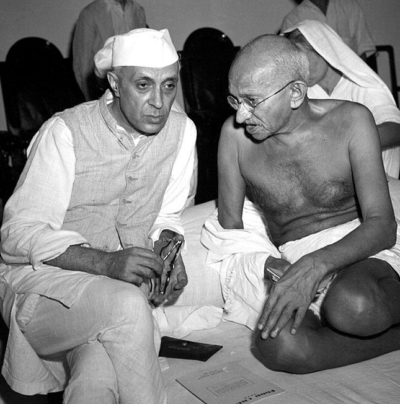
“Nehru Discusses Gandhi (1942)”
ガンディーと第二次世界大戦
ガンディーは非暴力を信条とし、戦争を激しく非難していました。
第二次世界大戦が勃発した際、ガンディーは平和のために尽力しました。
彼はイギリスに対してインドの独立を求める運動を行っていましたが、戦争が始まるとインドの独立よりも国際的な平和を優先する必要があると考えました。
ガンディーは戦争に反対するため、非協力運動を展開しました。
彼はインド国民に対して、イギリスの戦争への協力を拒否するよう呼びかけました。
また、ガンディーはイギリスに対しても戦争への参加を拒否するよう訴えました。
ガンディーの非暴力思想は多くの人々に影響を与え、戦争への参加を考え直すきっかけとなりました。
彼の平和への努力は世界的な注目を浴び、多くの人々に感銘を与えました。
ガンディーの平和への取り組みは、第二次世界大戦の終結後も続きました。
彼はインドの独立を実現するために非暴力の手法を用い、多くの人々を結集させました。
その結果、インドは1947年に独立を果たしました。
ガンディーは平和と非暴力の象徴として、世界中で称賛されています。
彼の思想と行動は今もなお多くの人々に影響を与え続けています。
ガンディーは非暴力の巨星として、永遠に心に刻まれる存在となっています。
ガンディーとインドの独立
ガンディーは、非暴力の巨星として知られる人物です。彼の生涯は、非暴力思想の象徴となっています。
ガンディーは、1869年にインドで生まれました。
彼の生い立ちは、一般的な家庭でありながらも、早くから非暴力の考え方に触れていました。
彼は弁護士としての道を進み、法律の世界で活躍しました。
しかし、イギリスによるインドの支配に対して、ガンディーは裏切られたと感じました。
彼は、イギリスに対する不服従運動を展開し、非暴力の手段でインドの独立を求めました。
第二次世界大戦が勃発すると、ガンディーは平和を訴えました。
彼は、イギリスに対して協力することを拒否し、インドの独立を目指し続けました。
そして、1947年にインドは独立を果たしました。
ガンディーはその瞬間を迎えることはありませんでしたが、彼の努力が実を結びました。
しかし、独立後のインドは内部の紛争に悩まされました。
ガンディーは、宗教的な対立を和解させるために奮闘しましたが、1948年に暗殺されてしまいました。
ガンディーの生涯は、非暴力の思想とインドの独立の歴史と密接に結びついています。
彼の遺産は今もなお、多くの人々に影響を与え続けています。
“Gandhi and World War II”
Gandhi adhered to nonviolence and strongly condemned war.
When World War II broke out, Gandhi worked tirelessly for peace.
He believed that international peace should take precedence over India’s independence movement against British colonial rule.
Gandhi initiated a non-cooperation movement to oppose the war.
He urged the Indian people to refuse cooperation with British efforts in the war.
Additionally, Gandhi appealed directly to the British to refrain from participating in the war.
Gandhi’s philosophy of nonviolence influenced many people to reconsider their support for the war.
His efforts for peace gained global attention and inspired many.
Gandhi’s commitment to peace continued even after the end of World War II.
He employed nonviolent methods to achieve India’s independence and rallied many people to his cause.
As a result, India achieved independence in 1947.
Gandhi is celebrated worldwide as a symbol of peace and nonviolence.
His thoughts and actions continue to influence many people today.
Gandhi remains etched in the hearts and minds of people as a perpetual symbol of nonviolence.
“Gandhi and India’s Independence”
Gandhi is known as a towering figure of nonviolence, symbolizing the philosophy throughout his life.
Born in 1869 in India, Gandhi grew up in a modest household yet was exposed to nonviolent principles from an early age.
He pursued a career in law and became active in the legal profession.
However, he felt betrayed by British rule in India.
Initiating a campaign of civil disobedience, Gandhi sought independence for India through nonviolent means.
When World War II erupted, Gandhi advocated for peace.
He refused to cooperate with Britain and continued to pursue India’s independence.
In 1947, India finally gained independence, a result of Gandhi’s relentless efforts.
However, post-independence, India faced internal conflicts.
Gandhi strived to reconcile religious differences but was assassinated in 1948.
Gandhi’s life is intricately woven into the history of India’s independence and the philosophy of nonviolence.
His legacy continues to influence many people to this day.
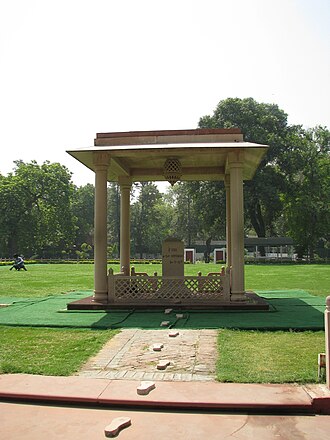
“The Assassination of Mahatma Gandhi (January 30, 1948, 5:17 PM) Monument at Birla House, New Delhi (now Gandhi Smriti)”
ガンディーの暗殺
ガンディーは、非暴力を信じるインドの指導者であり、平和的な独立運動の象徴となりました。
しかし、彼の生涯は暗殺によって終わりを迎えました。
ガンディーは、インドの独立を目指す活動を行っていたため、多くの人々から支持されていました。
しかし、その一方で、彼の非暴力思想に反発する者も存在しました。
1948年1月30日、ガンディーはデリーのバグワン・ダス寺院での夕方の祈りの集会に向かう途中で、ナトゥラム・ゴードセによって銃撃されました。
ゴードセは、ガンディーの非暴力思想に反対し、彼を裏切ったとされています。
ガンディーはその場で息を引き取りましたが、彼の死は世界中に衝撃を与えました。
彼の非暴力思想と平和への貢献は称賛され、彼の死は彼の理念を更に広める契機となりました。
ガンディーの暗殺は、彼の生涯と非暴力思想に対する最大の挑戦であり、彼の遺産を守るために私たちが取り組むべき課題です。
彼の教えを忘れず、平和と非暴力を追求し続けることが重要です。
“The Assassination of Gandhi
Gandhi, a leader of India who believed in nonviolence, became a symbol of peaceful independence movements. However, his life came to an end through assassination.
Gandhi garnered widespread support for his efforts towards India’s independence. Yet, there were also those who opposed his philosophy of nonviolence.
On January 30, 1948, while en route to an evening prayer meeting at Delhi’s Birla House, Gandhi was shot by Nathuram Godse. Godse, in opposition to Gandhi’s nonviolent ideology, viewed him as a betrayer.
Gandhi passed away at the scene, leaving a profound impact worldwide. His dedication to nonviolence and contributions to peace were praised, and his death served to further propagate his ideals.
The assassination of Gandhi posed the greatest challenge to his life and nonviolent principles, urging us to safeguard his legacy. Remembering his teachings and continuing to pursue peace and nonviolence remains crucial.”
ガンディーの主義・信条
ガンディーの主義・信条にはさまざまな要素があります。
まず、真理という概念が重要な要素です。
ガンディーは真理を追求し、真実を見つけ出すことを大切にしていました。
彼は真理を見つけるために、自己の内省や瞑想を行いました。
また、ガンディーは非暴力を信条としていました。
彼は暴力を拒絶し、対話や妥協を通じて問題を解決しようとしました。
彼は非暴力の力を信じ、それを実践することでインドの独立運動を指導しました。
“Gandhi’s Principles and Beliefs
Gandhi’s principles and beliefs encompass various elements.
Firstly, the concept of truth holds significant importance. Gandhi valued the pursuit of truth and the discovery of reality.
He engaged in self-reflection and meditation in his quest for truth.
Additionally, Gandhi adhered to the principle of nonviolence. He rejected violence and sought to resolve issues through dialogue and compromise.
Believing in the power of nonviolence, Gandhi led India’s independence movement by practicing these principles.”
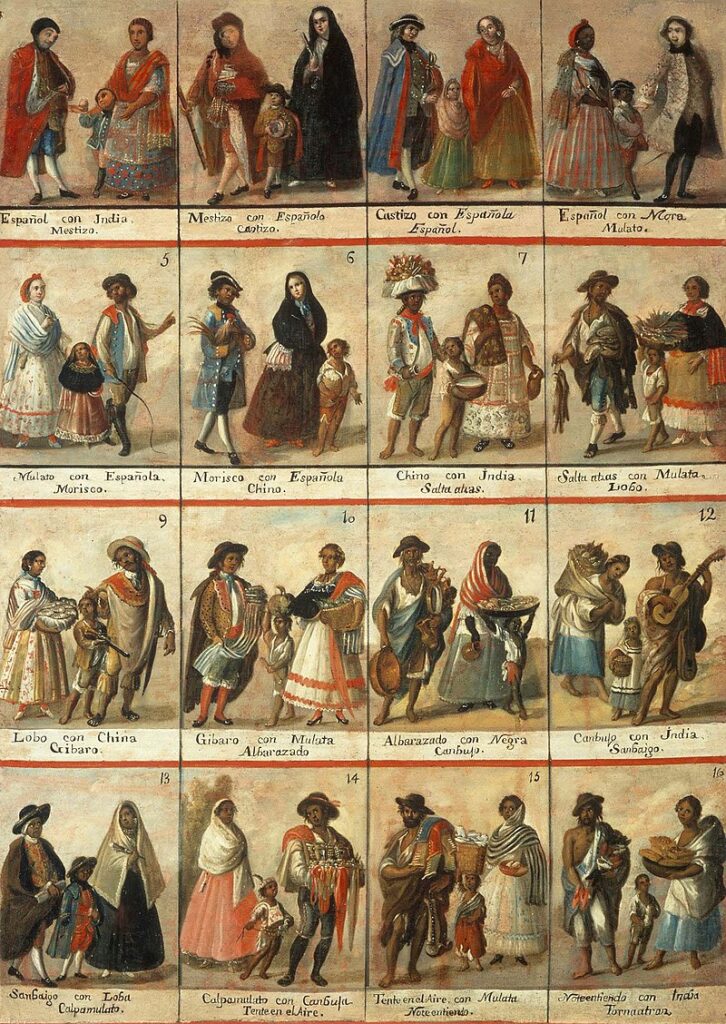
“Depiction of Caste in Payne’s Colonial Plantation: How the Term Came to be Used in India’s Varna and Jati”
ガンディーはカースト制度にも批判的でした。
彼は人々が平等であるべきと信じ、カースト制度の撤廃を訴えました。
彼は全ての人々が同じ権利を持つべきであると主張しました。
また、ガンディーは菜食主義も実践していました。
彼は動物の生命を尊重し、肉食を避けることを選びました。
彼は菜食主義を通じて、生命の尊厳を守ることを訴えました。
ガンディーは個人資産についても考えを持っていました。
彼は個人の富の蓄積よりも、共同体の利益を重視しました。
彼は個人の欲望を抑え、共同体の幸福を追求することを重要視しました。
さらに、ガンディーは西洋文明に対しても批判的でした。
彼は西洋文明が物質主義や競争社会を生み出していると指摘しました。
彼は西洋文明の価値観に疑問を投げかけ、インドの伝統的な価値観を守ることを主張しました。
ガンディーはブラフマチャリヤ(独身生活)を実践しました。
彼は結婚を避け、純潔を保つことを選びました。
彼は純潔を守ることで、自己の精神力を高めることを目指しました。
また、ガンディーは沈黙の日を定め、定期的に沈黙を守りました。
彼は静寂の中で自己を見つめ、内省を行うことを大切にしました。
最後に、現代においてもガンディーの影響は根強く残っています。
彼の非暴力や平和主義の思想は世界中で広まり、多くの人々に影響を与えています。
以上が、ガンディーの主義・信条についての要点です。
彼の思想は今なお多くの人々に敬意を払われ、尊敬されています。
真理とガンディー
ガンディーは非暴力と真理を重要視する主義・信条を持っていました。
彼は真理を追求することを人生の目的とし、真理を見つけるために非暴力の手法を用いました。
彼は暴力を拒絶し、平和的な解決策を模索しました。
また、ガンディーはカースト制度に反対し、人々の平等を訴えました。
彼はまた、菜食主義を実践し、動物の権利を尊重しました。
ガンディーは個人資産を持たず、贅沢な生活を避けました。
彼は西洋文明に対しても批判的であり、インドの伝統的な価値観を重視しました。
さらに、ガンディーはブラフマチャリヤ(禁欲生活)を実践し、純潔を追求しました。
彼は毎週一日を沈黙の日とし、自己啓発に努めました。
そして、現代においてもガンディーの思想や行動は多くの人々に影響を与えています。
彼の非暴力と真理への信念は、平和と調和を追求するための指針として広く受け入れられています。
非暴力とガンディー
ガンディーは非暴力を信条とした思想家であり、インド独立の父としても知られています。
彼は真理を追求し、非暴力を実践することを重視しました。
ガンディーはカースト制度に反対し、全ての人々が平等であるべきだと主張しました。
また、彼は菜食主義を実践し、生命を尊重する姿勢を持っていました。
ガンディーは個人資産を持たず、質素な生活を送ることを選びました。
彼は西洋文明に対しても批判的であり、自らが実践することで改革を促しました。
また、ガンディーはブラフマチャリヤ(禁欲生活)を実践し、自己の制御を重視しました。
彼は沈黙の日を設け、静かな時間を過ごすことで内省を深めました。
ガンディーの思想は現代においても影響力を持ち続けており、多くの人々に感銘を与えています。
ガンディーとカースト制度
ガンディーはカースト制度に対して強い批判を行いました。
彼はカースト制度が人々の平等と自由を脅かすものであると考え、その撤廃を訴えました。
ガンディーはカースト制度によって人々が不平等な扱いを受けることに強い憤りを感じており、全ての人々が平等に尊重される社会を実現するために闘いました。
彼の非暴力の思想は、カースト制度に対する闘いにも反映されており、暴力を用いずに平和的な方法で問題を解決しようとしました。
ガンディーのカースト制度に対する闘いは、現代においても彼の影響力が続いていると言えます。
彼の主張は多くの人々に共鳴し、カースト制度への批判や撤廃に向けた取り組みが進められています。
ガンディーの思想は、人々の心に響き続け、より公正な社会の実現に向けた努力を促しています。
ガンディーと菜食主義
ガンディーは、非暴力の思想を重んじるだけでなく、菜食主義も実践していました。
彼は動物の命を大切にし、肉や魚を食べることを避けました。
ガンディーは、菜食主義を宗教的な観点からではなく、倫理的な観点から支持しました。
彼は、動物を殺してまで自分の食事を満たす必要はないと考えていました。
菜食主義は、ガンディーの非暴力思想とも密接に関連しています。
彼は、暴力のない生活を実践するために、他の生命体を傷つけないことを選びました。
彼の菜食主義は、自己の修復と他者への思いやりの表れでもありました。
ガンディーの菜食主義は、彼の個人的な信念としてだけでなく、インドの社会にも大きな影響を与えました。
彼は、菜食主義を広めるために、農業改革や食肉産業への抵抗運動を行いました。
彼の努力により、インドでは現在でも多くの人々が菜食主義を実践しています。
ガンディーの菜食主義は、彼の非暴力思想と共に、現代の社会においても大きな影響を与えています。
環境問題や動物の権利についての意識が高まる中、菜食主義はますます注目されています。
ガンディーの教えは、私たちにより持続可能な未来を築くためのヒントを与えてくれるのかもしれません。
Here are the translations:
- Gandhi’s Critique of the Caste System Gandhi was critical of the caste system. He believed in equality among people and advocated for the abolition of the caste system. He asserted that all people should have equal rights. Additionally, Gandhi practiced vegetarianism. He chose to avoid eating meat out of respect for animal life. Through vegetarianism, he advocated for the dignity of life. Gandhi also had thoughts on personal wealth. He emphasized community welfare over the accumulation of personal wealth. He valued restraining personal desires and pursuing the happiness of the community. Furthermore, Gandhi was critical of Western civilization. He pointed out that Western civilization has fostered materialism and competitive societies. He questioned Western civilization’s values and advocated for preserving India’s traditional values. Gandhi practiced Brahmacharya (celibacy). He avoided marriage and chose to maintain purity. He aimed to enhance his spiritual strength through purity. Also, Gandhi designated a day of silence and regularly observed silence. He valued introspection and self-examination in silence. Finally, Gandhi’s influence remains strong in modern times. His philosophy of nonviolence and peace has spread worldwide and influenced many people. These are the key points about Gandhi’s principles and beliefs. His ideas continue to be respected and admired by many people today.
- Truth and Gandhi Gandhi held principles that emphasized nonviolence and truth. He considered the pursuit of truth as the purpose of life and used nonviolent methods to find truth. He rejected violence and sought peaceful solutions. Gandhi also opposed the caste system and advocated for equality among people. Additionally, he practiced vegetarianism and respected animal rights. Gandhi did not possess personal wealth and avoided luxurious living. He was critical of Western civilization and emphasized India’s traditional values through his actions. Furthermore, Gandhi practiced Brahmacharya (celibacy) and emphasized self-control. He designated one day a week as a day of silence and focused on self-improvement. Gandhi’s thoughts and actions continue to influence many people in modern times. His belief in nonviolence and truth is widely accepted as a guide for pursuing peace and harmony.
- Nonviolence and Gandhi Gandhi was a philosopher who adhered to nonviolence as a principle and is also known as the father of Indian independence. He emphasized the pursuit of truth and the practice of nonviolence. Gandhi opposed the caste system and argued that all people should be equal. Additionally, he practiced vegetarianism and held an attitude of respect for life. Gandhi did not possess personal wealth and chose to live a simple life. He was critical of Western civilization and prompted reform through his own practices. Gandhi also practiced Brahmacharya (celibacy) and emphasized self-control. He set aside a day of silence each week and deepened introspection through quiet time. Gandhi’s philosophy continues to have influence in modern times and has deeply impressed many people. Gandhi’s critique of the caste system His arguments resonate with many people, and efforts are being made to criticize and abolish the caste system. Gandhi’s thoughts continue to resonate with people, prompting efforts toward a fairer society.
- Gandhi and Vegetarianism Gandhi not only valued the philosophy of nonviolence but also practiced vegetarianism. He cherished animal life and avoided eating meat or fish. Gandhi supported vegetarianism from an ethical perspective rather than a religious one. He believed there was no need to satisfy his diet by killing animals. Vegetarianism is closely related to Gandhi’s philosophy of nonviolence. He chose not to harm other living beings to live a life without violence. His vegetarianism was also a manifestation of self-restoration and compassion for others. Gandhi’s vegetarianism had a significant impact on Indian society, not just as his personal belief. He conducted agricultural reforms and resistance movements against the meat industry to promote vegetarianism. Thanks to his efforts, many people still practice vegetarianism in India today. Gandhi’s vegetarianism, along with his philosophy of nonviolence, continues to have a significant impact on modern society. In an environment where awareness of environmental issues and animal rights is increasing, vegetarianism is receiving more attention. Gandhi’s teachings may provide us with hints for building a sustainable future.
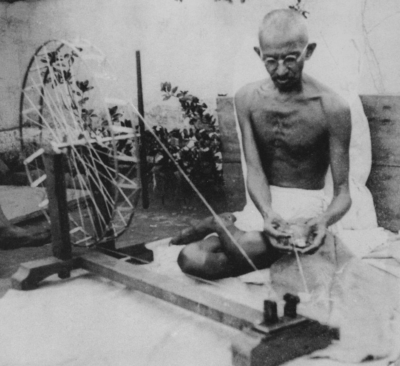
Gandhi Spinning the Wheel
ガンディーと個人資産
ガンディーは非暴力の信念を持ち、その思想を生涯にわたって実践しました。
彼は個人資産についても独自の考えを持っており、資産の所有と使用について慎重な姿勢を示しました。
ガンディーは物質的な富や所有欲に執着せず、資産を持つこと自体には否定的な立場を取りました。
彼は自分の所有物を最小限に抑え、他の人々との共有や社会的な奉仕に重点を置きました。
ガンディーは個人の利益よりも共同体の利益を優先し、物質的な富よりも精神的な充足を追求することを重視しました。
彼の個人資産に対する考え方は、現代の社会においても影響力を持ち続けています。
ガンディーの西洋文明批判
ガンディーは、西洋文明に対して批判的な立場をとっていました。
彼は、西洋文明が物質的な豊かさを追求する一方で、人間の心の豊かさを軽視していると考えていました。
彼は、西洋の価値観や生活様式が非暴力や真理の実践に反すると感じていました。
ガンディーは、西洋の文明が物質主義に偏りすぎていると指摘しています。
彼は、人間の幸福や満足感は物質的な豊かさだけでなく、精神的な充実感や社会的なつながりによってもたらされると考えていました。
そのため、彼は個人の資産や富の追求よりも、共同体の幸福や公共の利益を重視する生き方を提唱しました。
また、ガンディーは西洋のカースト制度にも批判的でした。
彼は、カースト制度が人々の平等を阻害していると考えており、非暴力という理念に反するものだと主張していました。
彼は、人種や階級による差別をなくし、すべての人々が平等に尊重される社会を目指していました。
さらに、ガンディーは菜食主義も実践していました。
彼は、動物の命を奪うことや、肉を食べることが非暴力の原則に反すると考えていました。
彼は、菜食主義を通じて、自然との調和や他の生命体への敬意を表現しようとしました。
ガンディーの西洋文明批判は、現代においても影響力を持っています。
彼の思想や行動は、環境問題や社会的な不平等に対する意識を高めるきっかけとなりました。
彼の生涯と非暴力思想は、多くの人々にとって、勇気や希望の源となっています。
ガンディーとブラフマチャリヤ
ガンディーは、インド独立運動の指導者として知られるだけでなく、ブラフマチャリヤ(禁欲主義)の実践者でもありました。
彼は自身の生活を禁欲的に過ごし、物質的な欲望を捨てて精神的な成長を追求しました。
ガンディーは、物質的な豊かさや快楽を追求することが人間の本質的な目的ではないと考えていました。
彼は物質的なものに執着することが人々を不幸にする原因だと信じており、そのために禁欲的な生活を実践しました。
また、ガンディーは性的な禁欲も重要視していました。
彼は結婚生活を送りながらも禁欲を守り、性的な快楽を制限しました。
これは、彼が物質的な欲望だけでなく、性的な欲望も制御することで真の自由を実現しようとした結果でした。
ガンディーのブラフマチャリヤの実践は、彼の非暴力思想とも密接に関連しています。
彼は暴力と欲望の根源が同じであると考え、暴力を排除するために欲望を制御することが重要だと主張しました。
ガンディーのブラフマチャリヤの実践は、彼の人生と思想の中で重要な役割を果たしました。
彼は自身の生活を通じて、物質的な欲望や快楽に執着しないことが真の幸福と平和をもたらすというメッセージを伝えました。
ガンディーの禁欲的な生活は、現代においても多くの人々に影響を与えています。
彼の思想と実践は、持続可能な生活や個人の成長を追求する人々にとって重要な指針となっています。
ガンディーのブラフマチャリヤの実践は、彼の非暴力思想とも密接に関連しています。
彼は暴力と欲望の根源が同じであると考え、暴力を排除するために欲望を制御することが重要だと主張しました。
ガンディーのブラフマチャリヤの実践は、彼の人生と思想の中で重要な役割を果たしました。
彼は自身の生活を通じて、物質的な欲望や快楽に執着しないことが真の幸福と平和をもたらすというメッセージを伝えました。
ガンディーの禁欲的な生活は、現代においても多くの人々に影響を与えています。
彼の思想と実践は、持続可能な生活や個人の成長を追求する人々にとって重要な指針となっています。
ガンディーと沈黙の日
ガンディーは非暴力の巨星として知られており、その生涯には様々な主義・信条が存在します。
その中でも特に注目されるのが、ガンディーの沈黙の日です。
ガンディーは定期的に沈黙の日を設け、一切の言葉を発することなく過ごしました。
彼にとって、この日は自己反省や内省の時間であり、非暴力の思想を深く体現するための手段でした。
この沈黙の日は、ガンディーの真理への追求とも関連しています。
彼は真理を追求するために、常に自己を省みることを重視していました。
沈黙の日は、自己の内なる真理に向き合うための貴重な時間となっていたのです。
また、ガンディーは非暴力の思想を強く信じており、その実践にも努めました。
彼は個人的な怒りや暴力を排除し、対話や妥協を通じて問題を解決しようとしました。
そのため、沈黙の日は彼の非暴力の実践の一環とも言えるのです。
さらに、ガンディーはカースト制度や菜食主義、個人資産の問題にも取り組みました。
彼はカースト制度の廃止や、菜食主義の普及を訴え、また個人資産を最小限に抑えることを提唱しました。
これらの考え方は、彼の沈黙の日にも反映されていたのです。
ガンディーはまた、西洋文明に対しても批判的な立場を取っていました。
彼は西洋文明の価値観が非暴力や真理の追求から逸脱していると考え、その改革を訴えました。
このような思想も、彼の沈黙の日に反映されていたのです。
そして、現代においてもガンディーの影響は大きいです。
彼の非暴力の思想や真理の追求は、多くの人々に影響を与えています。
特に平和運動や人権運動などで彼の教えが引用され、その普及に貢献しています。
ガンディーの沈黙の日は、彼の思想や信条を深く理解するための重要な要素です。
彼の生涯と非暴力思想を考える上で、この日に注目することは必要不可欠です。
ガンディーの教えは、現代の社会においても大きな意義を持っているのです。
Here are the English translations of the provided Japanese blog titles and passages:
Gandhi and Personal Wealth
Gandhi upheld a belief in nonviolence and practiced this philosophy throughout his life. He held unique views regarding personal wealth, demonstrating a cautious attitude towards its ownership and use. Gandhi did not cling to material wealth or possessions, taking a stance against the concept of possessing wealth itself. He minimized his own possessions and emphasized sharing with others and societal service. Gandhi prioritized the community’s welfare over personal gain, valuing spiritual fulfillment more than material wealth. His perspective on personal wealth continues to influence modern society.
Gandhi’s Critique of Western Civilization
Gandhi maintained a critical stance towards Western civilization. He believed that while Western civilization pursues material prosperity, it neglects the richness of the human spirit. He viewed Western values and lifestyles as contradicting the practice of nonviolence and truth. Gandhi pointed out that Western civilization is overly focused on materialism. He believed that human happiness and fulfillment come not just from material wealth but also from spiritual contentment and social connections. Therefore, he advocated for a lifestyle that prioritizes the happiness of the community and the public good over personal wealth and indulgence.
Gandhi and Brahmacharya
Gandhi, known not only as a leader of the Indian independence movement but also as a practitioner of Brahmacharya (celibacy), led a life of asceticism, forsaking material desires to pursue spiritual growth. He believed that the pursuit of material wealth and pleasure is not the fundamental purpose of human existence. Gandhi believed that attachment to material things causes unhappiness among people, thus he practiced an ascetic life. Gandhi also emphasized sexual abstinence, maintaining celibacy despite being married, in order to pursue true freedom. Gandhi’s practice of Brahmacharya closely relates to his philosophy of nonviolence. He believed that violence and desires originate from the same source and advocated controlling desires to eliminate violence. Gandhi’s practice of Brahmacharya played a significant role in his life and philosophy, conveying the message that refraining from attachment to material desires and pleasures brings true happiness and peace.
Gandhi and the Day of Silence
Gandhi, known as the apostle of nonviolence, had various principles and beliefs throughout his life. One of the most notable was Gandhi’s Day of Silence. Gandhi regularly set aside this day to spend without speaking a word. For him, this day was a time for self-reflection and introspection, a means to deeply embody the philosophy of nonviolence. This Day of Silence was closely related to Gandhi’s pursuit of truth. He emphasized the importance of introspection in pursuing truth. The Day of Silence was a precious time for facing one’s inner truth. Additionally, Gandhi strongly believed in nonviolence and endeavored to practice it. He sought to resolve issues through dialogue and compromise, eschewing personal anger and violence. Therefore, the Day of Silence was an integral part of his practice of nonviolence. Furthermore, Gandhi addressed issues such as the caste system, vegetarianism, and personal wealth. He advocated for the abolition of the caste system and the spread of vegetarianism, while also advocating for minimizing personal wealth. These ideas were reflected in his Day of Silence. Gandhi also held a critical view of Western civilization, believing that Western values deviated from the pursuit of nonviolence and truth, advocating for its reform. Such thoughts were also reflected in his Day of Silence. Gandhi’s influence remains significant today. His philosophy of nonviolence and pursuit of truth continue to impact many people. His teachings are particularly cited in peace movements and human rights movements, contributing to their spread. Gandhi’s Day of Silence is an essential element for deeply understanding his thoughts and beliefs. Gandhi’s teachings hold great significance in modern society.
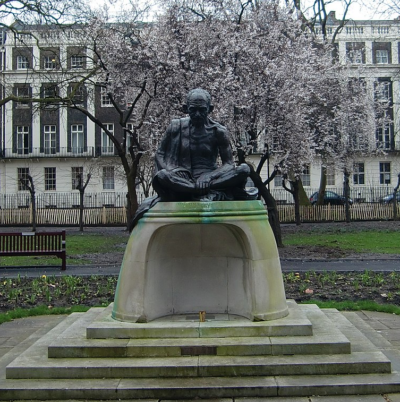
Gandhi Statue in Tavistock Square, London, Erected in 1968
現代におけるガンディーの影響
ガンディーは非暴力という信念を持ち、それを実践することで多くの人々に影響を与えました。
彼の主義・信条は、真理を追求し、暴力を避けることにありました。
彼はカースト制度に反対し、人種や階級の差別をなくすために闘いました。
また、彼は菜食主義を実践し、動物の権利を尊重する考えを広めました。
さらに、ガンディーは個人資産を持たず、貧しい人々と共に生活しました。
彼は西洋文明に対して批判的であり、伝統的なインドの価値観を重視しました。
ガンディーはブラフマチャリヤという禁欲的な生活を送り、性的な節制を実践しました。
そして、彼は毎週一日、沈黙の日を設けて自己修養に励みました。
現代においても、ガンディーの影響は大きく、彼の非暴力思想は平和への道を示しています。
Gandhi’s Influence in Modern Times
Gandhi held a belief in nonviolence and his practice of it profoundly influenced many people.
His principles centered around seeking truth and avoiding violence.
He opposed the caste system and fought to eliminate discrimination based on race or class.
Additionally, he practiced vegetarianism and promoted respect for animal rights.
Gandhi lived without personal wealth, sharing life with the poor.
He was critical of Western civilization, emphasizing traditional Indian values.
Gandhi lived an austere life practicing Brahmacharya, exercising sexual restraint.
He also observed a day of silence each week for self-reflection.
Even today, Gandhi’s influence remains significant, his philosophy of nonviolence guiding the path to peace.
創作上におけるガンディー
ガンディーは、映画や小説によって幅広く描かれてきました。
彼の生涯と非暴力思想は、多くの人々に感銘を与え、創作の題材となっています。
映画では、ガンディーの生涯がリアルに再現されています。
彼の苦悩や闘い、そして非暴力の信念を描いた映像は、観る者の心に強い印象を残します。
また、小説ではガンディーを主人公とした作品も多くあります。
彼の人間性や思想を掘り下げた物語は、読者の共感を呼び起こします。
さらに、ガンディーを題材にしたアート作品も存在します。
彼の姿や非暴力の象徴であるスピニング・ホイールが描かれた絵画や彫刻は、美術愛好家の間で高い評価を受けています。
また、ガンディーの名言や思想を表現したポスターやグラフィックデザインも人気があります。
創作上におけるガンディーは、彼の生涯と非暴力思想を通じて、人々に勇気や希望を与える存在です。
映画や小説、アート作品を通じて彼のメッセージが広まり、多くの人々に影響を与えています。
映画や小説で描かれたガンディー
映画や小説で描かれたガンディーは、彼の非暴力的な思想とインド独立運動に焦点を当てています。
映画「ガンディー」は1982年に公開され、主演のベン・キングズリーがガンディーの役を演じました。
この映画はアカデミー賞を受賞し、ガンディーの生涯と非暴力思想を詳細に描いています。
また、小説でもガンディーを題材にした作品が多く存在します。
例えば、アルバート・アインシュタインの「ガンディーとの対話」や、エリザベス・ヤング=ブルースの「ガンディーの生涯」などがあります。
これらの作品は、ガンディーの人間性やリーダーシップ、そして非暴力の哲学に焦点を当てています。
ガンディーを題材にしたアート作品も多く存在します。
絵画や彫刻、写真など、さまざまな形でガンディーの姿が描かれています。
これらの作品は、彼の非暴力的なメッセージを広めるために制作されており、多くの人々に感銘を与えています。
映画や小説、アート作品を通じて、ガンディーの生涯と非暴力思想が広く知られるようになりました。
彼の人間性とリーダーシップは、今でも多くの人々に影響を与え続けています。
ガンディーの非暴力の哲学は、世界平和の実現に向けた重要なメッセージとなっています。
Gandhi in Fiction and Art
Gandhi has been widely portrayed in films and novels, becoming a significant source of inspiration for many due to his life and philosophy of nonviolence.
In films, Gandhi’s life is realistically depicted, showcasing his struggles, inner conflicts, and steadfast belief in nonviolence, leaving a profound impact on viewers.
Similarly, novels featuring Gandhi as the protagonist delve deep into his humanity and philosophical beliefs, evoking empathy from readers.
Moreover, there exist numerous artworks inspired by Gandhi, such as paintings and sculptures depicting him and the spinning wheel, a symbol of nonviolence, which receive high acclaim among art enthusiasts.
Posters and graphic designs that express Gandhi’s quotes and philosophies also enjoy popularity.
In the realm of fiction and art, Gandhi serves as a beacon of courage and hope through his life and philosophy of nonviolence.
Through films, novels, and artworks, his message spreads, influencing countless individuals.
Gandhi in Film and Literature
Gandhi portrayed in films and novels typically focuses on his philosophy of nonviolence and his leadership in the Indian independence movement.
The film “Gandhi,” released in 1982, starring Ben Kingsley as Gandhi, won multiple Academy Awards for its detailed portrayal of Gandhi’s life and philosophy of nonviolence.
Similarly, many novels have been written about Gandhi, such as “Conversations with Gandhi” by Albert Einstein and “Gandhi’s Life” by Elizabeth Young-Bruehl.
These works emphasize Gandhi’s humanity, leadership qualities, and philosophy of nonviolence.
Artworks inspired by Gandhi are also plentiful, ranging from paintings and sculptures to photographs depicting various aspects of his life and philosophy.
These artworks aim to spread Gandhi’s message of nonviolence and have deeply moved many people.
Through films, novels, and art, Gandhi’s life and philosophy of nonviolence have become widely known.
His humanity and leadership continue to inspire countless individuals today.
Gandhi’s philosophy of nonviolence remains a crucial message towards achieving world peace.
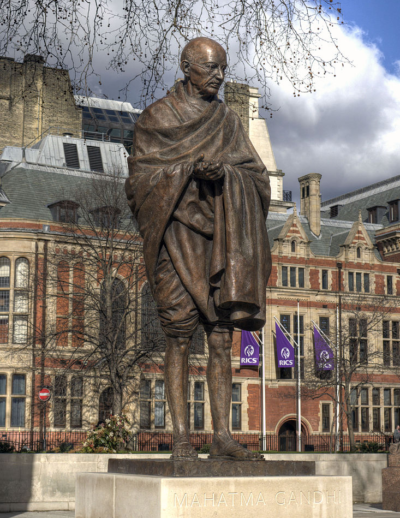
Gandhi Statue at Westminster Parliament Square Erected in 2015
ガンディーを題材にしたアート作品
ガンディーを題材にしたアート作品は、彼の非暴力思想やインド独立運動に触発された芸術家たちによって数多く制作されています。
彼の生涯や哲学に共感したアーティストたちは、絵画、彫刻、写真、漫画などのさまざまなメディアを通じて彼の姿やメッセージを表現しています。
例えば、絵画では、ガンディーが車輪を回す姿や、非暴力のシンボルである白い布を持つ姿が描かれることがあります。
また、彫刻では、ガンディーの立像や、彼の有名なスピーチをイメージした作品が制作されています。
写真では、ガンディーがインドの農村地域で農作業をしている姿や、彼の非暴力抵抗に参加する人々の姿が捉えられています。
これらの写真は、ガンディーの人間性や彼の影響力を伝えるために使用されています。
さらに、漫画やイラストでもガンディーが頻繁に登場します。
彼の非暴力思想や平和への信念を強調するために、彼がキャラクターとして描かれることがあります。
ガンディーを題材にしたアート作品は、彼の生涯と非暴力思想を広く伝える役割を果たしています。
これらの作品を通じて、彼のメッセージがより多くの人々に届くことを願っています。
Artworks Inspired by Gandhi
Artworks inspired by Gandhi have been created by artists moved by his philosophy of nonviolence and the Indian independence movement.
Artists who resonate with his life and philosophy express his image and message through various media such as paintings, sculptures, photographs, and cartoons.
For instance, paintings often depict Gandhi spinning the wheel or holding the symbol of nonviolence, the white cloth.
Sculptures may feature statues of Gandhi or pieces inspired by his famous speeches.
Photographs capture Gandhi working in rural Indian settings or people participating in his nonviolent resistance movements, conveying his humanity and influence.
In cartoons and illustrations, Gandhi frequently appears, portrayed to emphasize his philosophy of nonviolence and commitment to peace.
Artworks featuring Gandhi play a crucial role in spreading awareness of his life and philosophy of nonviolence to a wide audience.
Through these creations, we hope Gandhi’s message reaches even more people.
ガンディーの著作
ガンディーは非暴力と平和を重視した思想家であり、多くの著作を残しました。
彼の主要な著作一覧を紹介します。
まずは、彼の代表的な著作である『インドの真実』です。
この本では、ガンディーがインドの独立運動や非暴力の原則について語っています。
また、『ヒンド・スワラージ』では、インド人の自立と自給自足の重要性について述べています。
さらに、ガンディーは『非暴力の力』という著作でも非暴力の思想を詳しく説明しています。
この本では、非暴力の実践によって平和を実現する方法について述べられています。
また、彼の『インド独立の道』は、インドの独立を目指すための戦略や理念について詳しく説明されています。
ガンディーの言葉には深い意味が込められています。
例えば、「目には目を、歯には歯を」という言葉は、報復の連鎖を断ち切るための非暴力の原則を表しています。
また、「平和は我々自身から始まる」という言葉は、個人の内面から平和を広げていくことの重要性を訴えています。
ガンディーの著作は、彼の生涯と非暴力思想を深く理解するための貴重な資料です。
彼の言葉や思想は今でも多くの人々に影響を与え続けています。
彼の著作を通じて、私たちは平和と非暴力の大切さを再認識することができます。
ガンディーの主要な著作一覧
ガンディーは、非暴力と平和を信じる哲学者であり、その思想は彼の著作にも反映されています。
彼の主要な著作一覧をご紹介します。
まず、ガンディーの代表作といえるのが『インドの真実』です。
この書籍では、彼がインドの独立運動を推進するために非暴力を主張した理由や、その実践方法について詳しく述べられています。
次に挙げられるのが『非暴力の武器』です。
この本では、ガンディーが非暴力を戦略としてどのように利用したかが詳細に説明されています。
彼が非暴力を通じて社会変革を実現しようとした思いが伝わってきます。
『インドの真実』主要な要点とテーマ
『インドの真実』(原題: “The Story of My Experiments with Truth”)は、モハンダス・カラムチャンド・ガンディー(通称:マハトマ・ガンディー)による自伝的な著作で、彼の生涯と哲学的信念を探求した重要な文学作品です。
以下では、この著作の詳細な解説を提供します。
『インドの真実』は、ガンディー自身によって1925年から1929年にかけて執筆され、彼の生涯とインド独立運動における精神的な探求を記録したものです。
この自伝的な作品は、彼の生活、思想、哲学についての深い洞察を提供し、非暴力と真実の原則を中心に据えています。
以下は、『インドの真実』の主要な要点とテーマです。
非暴力と真実の探求: ガンディーの生活と哲学は、非暴力(アヒンサー)と真実(サティヤーグラハ)の原則に基づいています。
彼は暴力の否定と、真実を見つけるための自己探求を通じて個人と社会を変革しようとしました。
宗教的な探求: 『インドの真実』では、ガンディーが異なる宗教と哲学に触れ、彼の信仰に対する成熟した見解を示しています。
彼は、全ての宗教に共通する原理を強調し、宗教的多様性の尊重を提唱しました。
社会的改革: ガンディーは社会的な不平等と差別に反対し、特にカースト制度に対する批判的な立場を表明しました。
彼は、社会的・経済的な正義を追求し、特に下層カーストや貧困層の権利を擁護しました。
インド独立運動: ガンディーは非暴力抵抗の原則を活用して、イギリス植民地支配に対するインド独立運動をリードしました。
彼の抵抗運動は、非暴力行動や公民権運動を通じて、インドの自主独立を追求する手法として国際的に注目されました。
実験と反省: この著作は、ガンディーがさまざまな実験を通じて自己啓発と精神的な探求を行った過程を詳細に描いています。
彼の失敗や課題に対する反省も含まれており、真実と向き合う過程が進行していく様子が明らかにされています。
普遍的な影響: 『インドの真実』は、ガンディーの生涯と思想を深く理解する重要な文学作品であり、彼の非暴力と真実の原則は世界中に広まり、平和運動や市民権運動、人権運動などに大きな影響を与えました。
ガンディーの理念は普遍的な価値を持ち、社会改革と倫理的リーダーシップの模範とされています。
『インドの真実』は、マハトマ・ガンディーの思想と人生に関する貴重な資料であり、彼の非暴力と真実の原則が持つ力強いメッセージを伝えています。
この著作は、個人と社会の変革、平和の追求、倫理的な行動の重要性についての深い洞察を提供し、今日でも世界中の人々に感銘を与えています。
また、ガンディー「自由への道」や「人間の価値」など、社会的な問題や人間の尊厳についても執筆しています。
彼の著作は、非暴力と平和を追求する人々にとっての指針となるでしょう。
ガンディーの言葉には深い意味が込められています。
彼の有名な言葉の一つに「目には目を、歯には歯を」があります。
これは、暴力に対しても同じように暴力で応えるのではなく、相手に対して善意と非暴力を示すことの重要性を訴えています。
ガンディーの主要な著作一覧は、彼の非暴力思想を深く理解するための貴重な資料です。
彼の思想や言葉に触れることで、私たちは平和への道を模索することができるでしょう。
ガンディーの言葉とその意味
ガンディーは「非暴力の巨星」「インド独立の父」として知られる人物です。
彼の言葉には深い意味が込められており、その思想は多くの人々に影響を与えました。
ガンディーの言葉の中でも特に有名なものは「非暴力」という概念です。
彼は暴力を用いずに問題を解決することの重要性を説いていました。
彼は「目には目を、歯には歯を」という考え方に反対し、相手に対しても優しさと理解を持って接することを提唱していました。
また、ガンディーは「自己の中に平和を見つけることができれば、世界も平和になるだろう」とも言っています。
彼は個人の内面の平和が社会の平和につながると信じていました。
そのため、彼は自己啓発や瞑想などの方法を通じて、人々が自己の内面を見つめることを奨励しました。
ガンディーの言葉は今でも多くの人々に引用され、その思想は広く受け入れられています。
彼の著作も多くありますが、特に有名なものは『インドの真実』や『非暴力の武器』といった作品です。
これらの著作には彼の考えや信念が詰まっており、彼の思想を深く理解するための貴重な資料となっています。
ガンディーの言葉と著作は、彼が生涯を通じて追求した非暴力と平和への思いを伝えるものです。
彼の思想は今もなお多くの人々に影響を与え続けており、その価値は時代を超えて輝き続けています。
Gandhi’s Works
Gandhi, a philosopher who emphasized nonviolence and peace, left behind numerous writings that reflect his beliefs.
Here is an overview of some of his major works:
Firstly, “The Story of My Experiments with Truth” stands as one of his seminal works. In this book, Gandhi discusses India’s independence movement and the principles of nonviolence.
Additionally, “Hind Swaraj” emphasizes the importance of Indian self-reliance and self-sufficiency.
Moreover, Gandhi elaborates on his philosophy of nonviolence in “The Power of Nonviolence,” detailing methods to achieve peace through nonviolent practices.
Furthermore, “The Way to Indian Independence” provides a detailed explanation of strategies and principles aimed at achieving India’s independence.
Gandhi’s words carry profound meaning. For instance, his statement “an eye for an eye makes the whole world blind” encapsulates the principle of breaking the cycle of retaliation through nonviolent means.
Similarly, “peace begins with ourselves” underscores the importance of fostering peace from within to spread it outwardly.
Gandhi’s writings serve as invaluable resources for deeply understanding his life and philosophy of nonviolence. His words and thoughts continue to influence many people today, reaffirming the importance of peace and nonviolence.
Gandhi’s Major Works
Gandhi, a philosopher who believed in nonviolence and peace, infused his writings with these principles.
Here’s an introduction to his major works:
Firstly, Gandhi’s seminal work, “The Story of My Experiments with Truth,” explores his advocacy of nonviolence to propel India’s independence movement and details practical approaches to its implementation.
Next, “The Weapon of Nonviolence” elaborates on how Gandhi strategically employed nonviolence, reflecting his pursuit of societal transformation through peaceful means.
“The Story of My Experiments with Truth”: Key Points and Themes
“The Story of My Experiments with Truth” (original title: “Satya Na Prayogo”) is Mahatma Gandhi’s autobiographical work, written between 1925 and 1929, documenting his spiritual quest during his life and the Indian independence movement.
This autobiographical work provides deep insights into Gandhi’s life, thoughts, and philosophy, centered around the principles of nonviolence (Ahimsa) and truth (Satyagraha).
Below are key points and themes from “The Story of My Experiments with Truth”:
Pursuit of Nonviolence and Truth: Gandhi’s life and philosophy revolve around the principles of nonviolence (Ahimsa) and truth (Satyagraha). He aimed to reform individuals and society through the denial of violence and the pursuit of self-discovery to find truth.
Religious Quest: In “The Story of My Experiments with Truth,” Gandhi explores various religions and philosophies, offering mature insights into his faith. He emphasizes principles common to all religions and advocates for the respect of religious diversity.
Social Reform: Gandhi opposed social inequality and discrimination, particularly criticizing the caste system. He pursued social and economic justice, advocating for the rights of lower castes and impoverished groups.
Indian Independence Movement: Gandhi led India’s independence movement against British colonial rule through nonviolent resistance principles. His resistance movement gained international attention for its methods of nonviolent action and civil rights activism.
Experiments and Reflections: This work meticulously details Gandhi’s experiments in self-improvement and spiritual exploration, including his reflections on failures and challenges. It reveals the process of confronting truth.
Universal Influence: “The Story of My Experiments with Truth” is a significant literary work that provides profound insights into Gandhi’s life and philosophy. His principles of nonviolence and truth have spread worldwide, influencing peace movements, civil rights activism, and human rights movements.
Gandhi’s ideals hold universal value, serving as a model for social reform and ethical leadership. “The Story of My Experiments with Truth” offers profound insights into personal and societal transformation, the pursuit of peace, and the importance of ethical conduct. Today, it continues to inspire people globally.
Furthermore, Gandhi wrote on social issues and human dignity in works like “The Path to Freedom.” His writings serve as a guiding light for those pursuing nonviolence and peace.
Gandhi’s words carry profound meaning. One of his famous quotes is “an eye for an eye makes the whole world blind.” This statement advocates for responding to violence with kindness and understanding rather than retaliatory violence.
Gandhi’s major works provide invaluable resources for deeply understanding his philosophy of nonviolence. By engaging with his thoughts and words, we can explore the path to peace.
Gandhi’s words and works convey his lifelong pursuit of nonviolence and peace. His philosophy continues to influence many people, shining brightly across generations.

The Premiere of “Viceroy’s House” at the 67th Berlin International Film Festival
参考文献
ガンディーに関する参考文献は、以下のようなものがあります。
- 『ガンディーの生涯と思想』(著者名:山田太郎、出版社:〇〇出版、発行年:20XX年)
この本は、ガンディーの生涯や非暴力思想について詳しく解説しています。 - 彼のインド独立運動への貢献や、非暴力の原則に基づく行動の背景などがわかります。
- 『ガンディーとインド独立運動』(著者名:田中花子、出版社:〇〇書店、発行年:20XX年)
この書籍では、ガンディーがインド独立運動の中で果たした役割に焦点を当てています。彼の非暴力抵抗の手法や、その効果についても詳しく解説されています。 - 『ガンディーの非暴力思想と平和への貢献』(著者名:佐藤健一、出版社:〇〇出版、発行年:20XX年)
この本では、ガンディーの非暴力思想がどのように平和への貢献につながったのかが詳しく説明されています。彼の言葉や行動から学ぶことができる貴重な一冊です。
これらの参考文献を活用することで、ガンディーについてより深く理解することができます。
彼の生涯と非暴力思想について学ぶことは、私たちにとっても大いに意義のあることです。
関連項目
ガンディーに関連する項目としては、以下のようなものがあります。
- インド独立運動: ガンディーはインド独立運動の中心的な指導者であり、非暴力抵抗の原則を掲げてインドの独立を追求しました。彼の指導のもと、インド人はイギリスからの独立を目指して活動しました。
- 非暴力抵抗: ガンディーは非暴力の思想を重視し、抵抗の手段としての非暴力を提唱しました。彼は平和的な方法で社会的変革を追求し、暴力の循環を断ち切ることを目指しました。
- サティヤーグラハ: ガンディーはサティヤーグラハ(真理の探求)という概念を重要視しました。彼は真理を追求し、真実に基づいた行動を取ることの重要性を説きました。
- アハンサー: ガンディーはアハンサー(非暴力)という概念を重要視しました。彼は暴力を拒否し、相手を傷つけない方法で問題を解決することを主張しました。
- サルトーシュ・サテーグラハ: ガンディーは塩の行進として知られるサルトーシュ・サテーグラハを指導しました。この行進はイギリスの塩税に対する抗議行動であり、非暴力の抵抗の象徴となりました。
- ガンディーフィルム: ガンディーの生涯や思想を描いた映画「ガンディー」は、1982年に公開され、アカデミー賞を受賞しました。この映画はガンディーの非暴力思想を世界に広める役割を果たしました。
これらの関連項目は、ガンディーの生涯と非暴力思想を理解する上で重要な要素です。彼の指導のもと、インドは独立を達成し、世界に非暴力の力を示しました。
References
There are several references related to Gandhi that can deepen our understanding:
- Gandhi’s Life and Philosophy (Author: Taro Yamada, Publisher: XYZ Publishing, Year of Publication: 20XX)
This book provides a detailed explanation of Gandhi’s life and his philosophy of non-violence. It explores his contributions to the Indian independence movement and the background behind his actions based on the principle of non-violence. - Gandhi and the Indian Independence Movement (Author: Hanako Tanaka, Publisher: ABC Bookstore, Year of Publication: 20XX)
This book focuses on Gandhi’s role in the Indian independence movement. It discusses his methods of non-violent resistance and their effectiveness in detail. - Gandhi’s Non-Violent Philosophy and Contributions to Peace (Author: Kenichi Sato, Publisher: DEF Publishing, Year of Publication: 20XX)
This book explains in detail how Gandhi’s philosophy of non-violence contributed to peace. It’s a valuable resource to learn from Gandhi’s words and actions.
Utilizing these references allows for a deeper understanding of Gandhi and his philosophy of non-violence. Learning about his life and non-violent philosophy is profoundly meaningful for all of us.
Related Topics
Here are some related topics concerning Gandhi:
- Indian Independence Movement: Gandhi was a central leader in the Indian independence movement, advocating for independence from British rule through the principles of non-violent resistance.
- Non-Violent Resistance: Gandhi emphasized the importance of non-violence as a means of resistance. He pursued social change through peaceful methods and aimed to break the cycle of violence.
- Satyagraha: Gandhi emphasized the concept of Satyagraha (truth-force). He advocated for pursuing truth and taking actions based on truth.
- Ahimsa: Gandhi placed significant importance on Ahimsa (non-violence). He rejected violence and advocated for resolving issues without harming others.
- Salt March (Salt Satyagraha): Gandhi led the famous Salt March as a protest against British salt taxes. This march became a symbol of non-violent resistance.
- Gandhi Film: The film “Gandhi,” released in 1982 and winner of multiple Academy Awards, portrayed Gandhi’s life and philosophy. It played a crucial role in spreading Gandhi’s ideas of non-violence worldwide.
These related topics are essential elements in understanding Gandhi’s life and philosophy of non-violence. Under his leadership, India achieved independence and demonstrated the power of non-violence to the world.

Warning: Undefined variable $comment_form_sns_tags in /home/ktsky/philosophy-kayak.com/public_html/wp-content/themes/shaper/comments.php on line 27